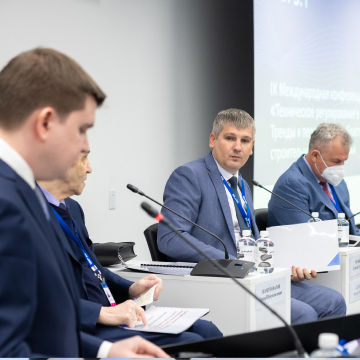The participants of 100+ TechnoBuild discussed trends and prospects in the field of building rationing

The authorities have almost completely reduced excessive requirements in the construction industry, which were declarative in nature, said Sergey Muzychenko, Deputy Minister of Construction and Housing of the Russian Federation, speaking at the VIIIth International Construction Forum and the 100+ TechnoBuild exhibition in Yekaterinburg.
"We reduced 3,000 claims last year, and 3.8 thousand claims this year. They were declarative in nature and overlapped with other regulatory requirements," he said.
Anton Shalaev, head of the Federal Agency for Technical Regulation and Metrology, clarified that the main task was to avoid inconsistencies and duplication of standardization documents. As a result, an up-to-date fund of regulatory documents should appear.
Muzychenko said that in the future it is planned to switch from a strict prescriptive method of rationing to a flexible function-oriented (parametric) method. It will make it possible to integrate new technologies into regulatory documents as soon as possible.
Another promising area is the translation of regulatory documents into a machine–readable format, which will allow for the stages of design and expertise to be carried out simultaneously. In addition, the authorities plan to work on integrating the requirements of "green" construction into the system of technical regulation, coordinate interested federal executive authorities and technical committees in the development of regulatory documents, as well as develop other areas.
"Reducing requirements implies a flexible approach. For the industry as a whole, this means shorter terms of the investment and construction cycle, cost reduction, but without reducing quality. The main goal is to reduce administrative barriers and accelerate construction in general," said Andrey Kopytin, Acting Director of the FAA FTS.
According to Anvar Shamuzafarov, President of the Russian Union of Builders, 80% of the facilities are currently being built with private investment. He noted that the role of the state in rationing construction should be reduced: the responsibility should be borne by business.
"The support should be engineering, but this engineering does not necessarily have to be public, it can also be private. We continue to impose on the state level what should not be imposed on the state level: if the state does not pay money, then control should be reduced, naturally, ensuring security," he said.
Muzychenko agreed that such an approach should be implemented, but it should be done gradually.
"In my opinion, we are trying to treat the symptoms of the disease by generating new ones. And what lies at the root of the disease, we are trying in every possible way to avoid. We need to think about how good building codes become bad. Our whole procedure does not allow us to focus on the consumer for whom we are creating the document," summed up Igor Lishai, Director of RUE Stroytechnorm.
Andrey Lotsmanov, Deputy co-chairman of the Russian Union of Industrialists and Entrepreneurs' Committee on Industrial Policy and Technical Regulation, clarified that it had been decided to create a coordinating council in the construction sector, which would take into account the opinions of experts from various industries and ministries when creating a new regulatory framework in construction.

